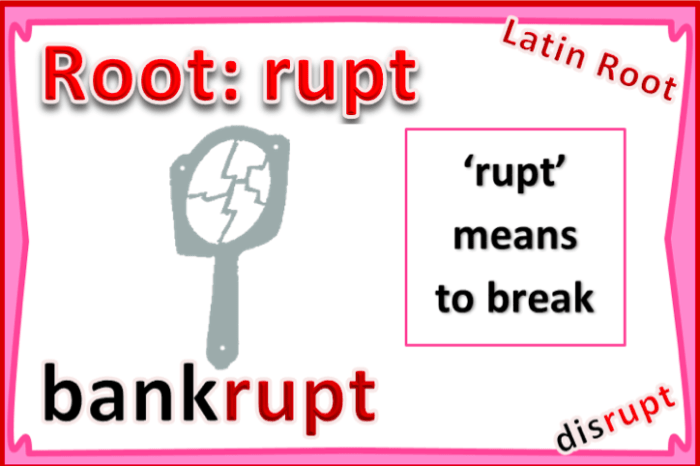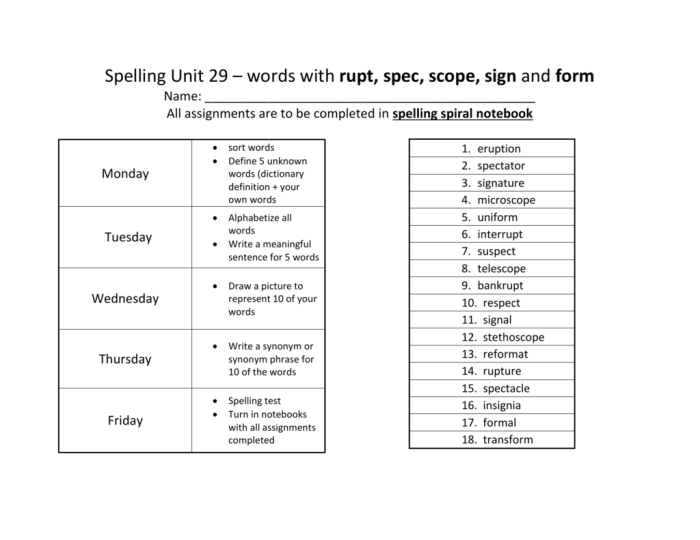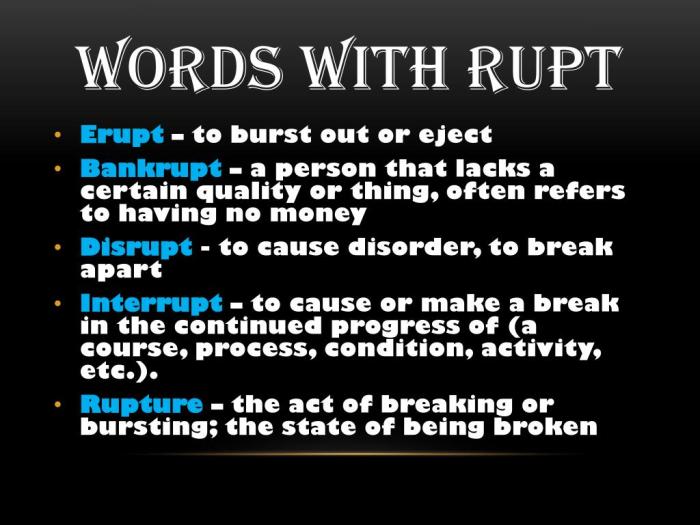Words with the stem rupt – Words with the stem “rupt” are a fascinating group of terms that have a rich history and diverse usage. From their Latin roots to their modern-day applications, these words offer insights into the evolution of language and the nuances of human communication.
In this comprehensive guide, we delve into the etymology, morphology, semantics, syntax, and pragmatics of words with the stem “rupt,” providing a thorough understanding of their origins, structure, meanings, usage patterns, and communicative effects.
Etymology of Words with the Stem “Rupt”

The stem “rupt” originates from the Latin verb “rumpere,” meaning “to break.” This root has given rise to a variety of English words that share the semantic field of breaking, disruption, or separation.Over time, the meaning of words with the stem “rupt” has undergone subtle shifts.
For instance, “rupture” initially referred to a physical break or tear but later extended to include emotional or psychological breaks. Similarly, “corrupt” originally meant “to break or destroy,” but its current usage primarily focuses on moral or ethical violations.
Historical Development of the Stem “Rupt”
The Latin verb “rumpere” is a strong verb that belongs to the third conjugation. Its principal parts are:
- Present active: rumpo
- Perfect active: rūpī
- Supine: ruptum
The supine form, “ruptum,” is the source of the English stem “rupt.” This stem has been borrowed into English through various channels, including direct Latin loanwords and French intermediaries.
Semantic Shifts and Changes in Meaning
The following are some examples of how the meaning of words with the stem “rupt” has changed over time:
- “Rupture”: Originally referred to a physical break or tear, but now also includes emotional or psychological breaks.
- “Corrupt”: Originally meant “to break or destroy,” but now primarily focuses on moral or ethical violations.
- “Interrupt”: Originally meant “to break between,” but now generally refers to any interruption or disruption.
- “Abrupt”: Originally meant “broken off,” but now primarily describes something sudden or unexpected.
These semantic shifts reflect the evolving nature of language and the ways in which words adapt to changing social and cultural contexts.
When we talk about words with the stem rupt, we can’t help but think of the epic journey in chapter 11 of the hobbit . The hobbits’ adventure is filled with moments of disruption and upheaval, mirroring the very essence of the stem rupt.
And as we delve deeper into the nuances of words with this stem, we can’t shake the feeling that the hobbits’ journey serves as a poignant allegory for the transformative power of language.
Morphological Analysis of Words with the Stem “Rupt”: Words With The Stem Rupt

The stem “rupt” can be combined with various affixes and suffixes to form different words with distinct meanings and grammatical functions. These affixes and suffixes can alter the stem’s meaning, part of speech, or tense.
Prefixes
- Inter-: Denotes a reciprocal or mutual action. Example: interrupt(to break in between)
- Cor-: Implies a breaking together or apart. Example: corrupt(to break apart)
Suffixes
- -ion: Forms nouns denoting the action or process of breaking. Example: eruption(the act of breaking out)
- -ive: Creates adjectives that describe something causing a break or rupture. Example: ruptive(causing a break)
- -ure: Forms nouns that refer to the result of a break or rupture. Example: rupture(a break or tear)
Semantic Field of Words with the Stem “Rupt”
Words with the stem “rupt” share a common semantic field related to breaking, interrupting, or violating something. These words can be grouped into several categories based on their specific meanings and nuances.
Breaking, Words with the stem rupt
- rupture: to break or burst apart, often violently
- ruptured: broken or burst
- rupturing: in the process of breaking or bursting
Interrupting
- interrupt: to break into or stop something in progress
- interrupted: broken into or stopped
li> interrupting: in the process of breaking into or stopping something
Violating
- rupture: to violate or break a rule, law, or agreement
- ruptured: violated or broken
- rupturing: in the process of violating or breaking something
Within each category, there are subtle nuances in meaning. For example, “rupture” can refer to both breaking something physical or violating a rule, while “interrupt” specifically refers to breaking into or stopping something in progress. These distinctions are important to consider when using these words in context.
Syntactic Patterns of Words with the Stem “Rupt”

Words with the stem “rupt” exhibit distinct syntactic patterns in English sentences. These patterns reflect the grammatical functions that these words can perform, such as verbs, nouns, and adjectives.
Verbs
- Words with the stem “rupt” are frequently used as verbs, indicating a sudden or forceful break or disruption.
- Examples: The glass ruptured under the pressure. The storm ruptured the roof of the house.
Nouns
- Nouns derived from the stem “rupt” refer to the result of a rupture or disruption.
- Examples: The rupture in the pipeline caused a major leak. The rupture in his relationship with his family was devastating.
Adjectives
- Words with the stem “rupt” can also function as adjectives, describing something that is broken or disrupted.
- Examples: The ruptured pipe spewed water all over the basement. The ruptured relationship left a deep scar on her heart.
Pragmatic Uses of Words with the Stem “Rupt”

Words with the stem “rupt” carry inherent connotations of breaking, disrupting, or violating. Their usage extends beyond literal contexts, effectively conveying emotions, attitudes, and intentions in diverse contexts.
Subtlety and Nuance
In academic writing, words like “rupture” or “disrupt” are employed to describe the breakdown of systems or theories. By using these terms, authors can convey the gravity of the disruption without resorting to overly emotive language.
In journalistic writing, “corrupt” or “rupture” can be used to expose wrongdoing or highlight the erosion of trust. The choice of these words implies a level of shock or outrage, capturing the reader’s attention and emphasizing the seriousness of the situation.
In literary works, “rupture” or “interruption” often serve as metaphors for emotional or psychological turmoil. These words allow authors to explore the complexities of human experience and convey deep-seated feelings without resorting to explicit descriptions.
Questions and Answers
What is the origin of the stem “rupt”?
The stem “rupt” originates from the Latin word “rumpere,” meaning “to break.” It has been borrowed into English and other languages, where it has acquired a range of related meanings.
What are some common affixes used with the stem “rupt”?
Common affixes used with the stem “rupt” include the prefixes “inter-” (meaning “between”), “dis-” (meaning “apart”), and “sub-” (meaning “under”), as well as the suffixes “-ion” (forming nouns) and “-ure” (forming nouns).
What is the semantic field of words with the stem “rupt”?
Words with the stem “rupt” belong to a semantic field related to breaking, interrupting, or violating. They can be grouped into categories such as “physical disruption,” “interruption of communication,” and “violation of rules or norms.”